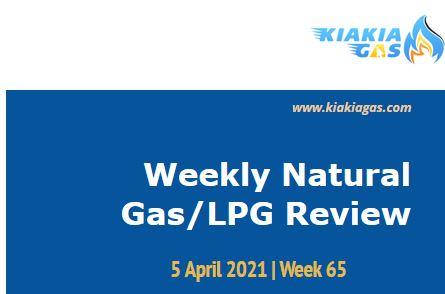Week 65: Natural Gas Report
The Weekly Natural Gas Review is your resource for understanding where the natural gas market is and how it has developed.

The Weekly Natural Gas Review is your resource for understanding where the natural gas market is and how it has developed.


The Department of Petroleum Resources (DPR) called upon market forces, in the interests of guaranteeing security of supply and demand of the commodity, to be able to determine gas prices so as to make a meaningful contribution to economic development in Nigeria.
The DPR has noted that gas pricing is critical on both the right and the market basis because it would ensure producers' returns on investment and make the commodity affordable for consumers.
Right gas pricing was deemed to require special attention to guarantee the security of the gas supply and the safety of credible gas demand.
Reuters reported that Australia, the world's leading liquefied natural gas exporter, faces a dilemma in domestic fuel demand, as government plans for a gas-fired economic recovery face some confrontational reality.
The need for fuel from remote areas of the country for new pipeline infrastructure to boost exploration is often discussed addressing the lack of domestic gas supply that consumers are facing over two or three years.
The most prominent solution is to encourage exploration, possibly with government subsidies, to bring new production online. However, most forward-looking basins will be expensive to develop, and extensive pipeline infrastructure will be needed to carry the large fuel distances.
For a change to the fiscal terms of the El Fayum Concession now subject to approval of the Government, Pharos Energy received interim approval from the Egyptian General Oil Corporation (EGPC).
Under the new conditions, Pharos is to increase its percentage of cost recovery petroleum from 30% to 40%, enabling all its past and future investments to recover significantly more quickly.
In exchange, Pharos agreed I to waive its entitlement to recuperate a portion of the previous cost pool ($115 million) and (ii) to reduce its excess cost recovery share from 15% to 7.5%.
Reuters reported on Thursday after news that OPEC+ reached a deal to slow down production cuts from May, oil prices increased by 3 percent.
In May, another 350 000 bpd in June and an additional 400 000 bpd or so in July, OPEC+, which includes an Organization of the Petroleum exporting countries, Russia and other Allied producer countries, has agreed to ease production restrictions by 350,000 barrels per days (bpd).
Brent Crude raised by 1.94 dollars or 3.1 percent by 1:25 EST to 64.68 dollars a barrel (1825 GMT) while the U.S. oil increased $2.10, or 3.6%, by 61.26 dollars per barrel.
Reuters reported that Pioneer Natural Resources, a U.S. oil producer, agreed to acquire DoublePoint Energy, which is private, for approximately $6.4 billion, accelerating the consolidation of shale oil producers on Thursday. This year, Oilfield roll-ups have accelerated as prices recover following the market crash driven by coronaviruses last year.
Companies with strong balances have snapped debt-laden and private operators and are committed to concentrating profit on volume growth.
Acquisitions by mature operators of rapidly growing petroleum companies like DoublePoint Energy will alleviate concern that U.S. shale can again supply over the market and crash prices.
Reuters reported that Chile's competition authority approved a $3 billion takeover from the Spanish power company Naturgy's Chilean unit Compania General de Electricidad, on Wednesday by China's State Grid International (CGE).
Despite mounting political pressure, the consortium behind Nord Stream 2 has moved forward with construction. Pipe laying is scheduled to begin at the end of March and last until the third quarter of 2021.
The US has criticized a plan to build a pipeline connecting Russia and Germany in order to pump more Russian gas into Europe, claiming that it will strengthen Russia's economic and political clout in the region.
Tullow Oil announced it is now completing its sale to Panoro Energy of its assets in Equatorial Guinea. The $88.8 million Panoro was paid to Tullow. The transaction includes contingent cash payments up to 16 million dollars, which are related to asset performance and oil price as previously disclosed.
The closure is based on the satisfaction of all terms and conditions of completion, including the approval of the Equatorial Guinea and Tullow and Panoro Government and other customary third-party approvals.
In the second quarter of 2021, the Dussafu Asset will be sold to Panoro in Gabon. An additional $5 million will be paid to Tullow following completion of both transactions with Panoro.
Olamilekan Adegbite, Federal Government Minister for Mines and Steel Development, announced Tuesday that it will be auctioning its bitumen block in the third quarter of this year. This is in response to the High Commissioner of Australia's inquiry, John Donnelly, who on Tuesday visited the Ministry of Mining.
The ministry has been collecting data on some bitumen fields and is about to complete it, according to a statement published in Abuja, by his media assistant Ayodeji Aderemi. He noted that the local development of the bitumen sector had ample opportunities for investors.
The Nigerian LPG Market is the next success story of the Global LPG industry, if you need a partner with a global perspective and local expertise in the Nigerian and African space, kindly book for a free session with our team of experts to help you http://www.kiakiagas.com/book-session or write us an email at advisory@kiakiagas.com or Whatsapp: +2348085269328